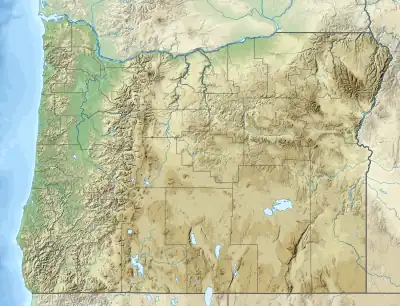| Middle Santiam River | |
|---|---|
 Sunnyside County Park on the Middle Santiam River. | |
 Location of the mouth of the Middle Santiam River in Oregon | |
| Etymology | Kalapuya tribe that lived near the river until removal to the Grande Ronde Reservation[1] |
| Location | |
| Country | United States |
| State | Oregon |
| County | Linn |
| Physical characteristics | |
| Source | Iron Mountain |
| • location | Cascade Range, Willamette National Forest, Linn County, Oregon |
| • coordinates | 44°24′09″N 122°09′43″W / 44.40250°N 122.16194°W[2] |
| • elevation | 4,149 ft (1,265 m)[3] |
| Mouth | South Santiam River |
• location | Foster Reservoir, Linn County, Oregon |
• coordinates | 44°24′58″N 122°38′02″W / 44.41611°N 122.63389°W[2] |
• elevation | 640 ft (200 m)[2] |
| Length | 39 mi (63 km)[4] |
| Basin size | 104 sq mi (270 km2)[5] |
The Middle Santiam River is a tributary of the South Santiam River, 38.5 miles (62.0 km) long, in western Oregon in the United States. It drains a remote area of the Cascade Range east of Sweet Home in the watershed of the Willamette River.
It rises in the Cascades in eastern Linn County in the Willamette National Forest, about half a mile west of Iron Mountain. It flows briefly north, then generally west and southwest through the mountains and Middle Santiam Wilderness. In central Linn County it is impounded at the Green Peter Dam to form the Green Peter Reservoir. Approximately 4 miles (6 km) downstream from the dam it joins the South Santiam from the northeast as an arm of Foster Reservoir.
| location | geolocation | usgs map |
|---|---|---|
| mouth, Foster Lake | 44°24′58″N 122°38′02″W / 44.416235°N 122.633972°W | Sweet Home |
| junction Quartzville Creek Green Peter Lake | 44°28′34″N 122°30′02″W / 44.476235°N 122.500638°W | Cascadia |
| RM 15.4 | 44°30′01″N 122°23′44″W / 44.500401°N 122.395636°W | Yellowstone Mountain |
| RM 25.3 | 44°31′01″N 122°15′02″W / 44.517068°N 122.250632°W | Chimney Peak |
| source | 44°24′09″N 122°09′43″W / 44.402623°N 122.162015°W | Harter Mountain |
Tributaries
Named tributaries of the Middle Santiam River from source to mouth are Cougar, Holman, Lake, South Pyramid, Bachelor, Pyramid, Donaca, Jude, and Egg creeks, followed by Fitt, Chimney, Sixes, Bear, and Twin Falls creeks. Below that are Cougar, Crash, Maple, Elk, Knickerbocker and Cave creeks. Then come Tally, Quartzville, Whitcomb, Rumbaugh, and Thistle creeks. Finally are Green Peter, Little Bottom, Alder, Coal, and Lewis creeks.[6]
See also
References
- ↑ McArthur, Lewis A.; McArthur, Lewis L. (2003). Oregon Geographic Names (Seventh ed.). Portland, Oregon: Oregon Historical Society Press. p. 848. ISBN 0-87595-277-1.
- 1 2 3 "Middle Santiam River". Geographic Names Information System (GNIS). United States Geological Survey. November 28, 1980. Retrieved July 25, 2009.
- ↑ Google Earth elevation for GNIS coordinates
- ↑ United States Geological Survey. "United States Geological Survey Topographic Map". TopoQuest. Retrieved July 25, 2009. The map quadrants include river mile (RM) markers for the river's first 35 miles (56 km). The additional length is approximate.
- ↑ "Willamette Basin Total Maximum Daily Loads (TMDLs): Chapter 9: South Santiam Subbasin TMDL" (PDF). Oregon Department of Environmental Quality. 2006. Archived from the original (PDF) on September 30, 2011. Retrieved August 9, 2010.
- ↑ "United States Topographic Map". United States Geological Survey. Retrieved January 15, 2016 – via ACME Mapper.